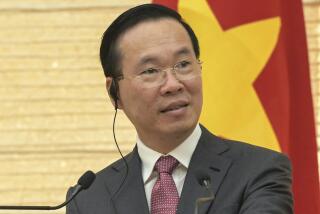Shultz Glum About Hanoi Under Aging New Premier
- Share via
SINGAPORE — Secretary of State George P. Shultz said Friday that the selection of an aging hard-liner to be the new premier of Vietnam “seems to snuff out” hope for an early end to Hanoi’s occupation of Cambodia.
“It’s a rather discouraging matter,” Shultz said after two days of consultations with the foreign ministers of the six countries that make up the Assn. of Southeast Asian Nations.
Although Communist Vietnam has been shunned by its more prosperous, free market-oriented neighbors, it was the focus of attention at the ASEAN meeting, both as the occupier of Cambodia and as the source of the refugees who are an increasingly unwelcome burden on other countries.
Consensus Missing
No new consensus for dealing with Vietnam or the refugee problem emerged from the talks between the ASEAN members--Brunei, Indonesia, Malaysia, the Philippines, Singapore and Thailand--and the representatives of industrialized democracies--the United States, Canada, Japan, Australia, New Zealand and the European Communities.
Talking at a press conference a day after Pham Hung, 75, succeeded Pham Van Dong as Vietnamese premier, Shultz said that “as far as we can see, the nature of the people who have now emerged (in Vietnam) seems to snuff out what seemed like possible potential flexibility” on the Cambodia issue.
Shultz’s assessment was echoed by representatives of the ASEAN countries. A senior U.S. official said that almost all the foreign ministers who met Shultz in a series of private meetings agreed that the Vietnamese leadership is “more hard-line than expected.”
‘A Step Back’
A senior Singapore diplomat said Hung’s selection, combined with other Vietnamese personnel changes, “was a step back.”
In the absence of any change in attitude by Vietnam, Shultz said, the United States will continue to try to isolate the Hanoi regime both diplomatically and politically. And he said that Washington will continue to support the “non-Communist resistance” in Cambodia.
Officially, ASEAN supports both U.S. objectives. However, ASEAN countries, especially Singapore, continue to trade with Vietnam. Japanese companies have recently undertaken an aggressive campaign to sell goods to Hanoi.
Shultz minimized the impact of the trade. He said it is not excessive, and “to the extent it takes place at all, it is not sanctioned by the governments involved.”
Potentially more embarrassing to ASEAN and the United States is the presence in Thailand of the anti-Vietnamese Cambodian resistance movement of the Khmer Rouge, the Marxist clique that killed millions of Cambodians when it controlled the nation’s government in the late 1970s before the Vietnamese invasion.
Shultz made it clear that U.S. support for the resistance does not include the Khmer Rouge and its leader, Pol Pot.
“Pol Pot and his supporters have a track record in government that is a very reprehensible one,” Shultz said. “So we can never support a return of that group to power.”
But an ASEAN diplomat said the Khmer Rouge is the most effective fighting force in the resistance, so “right now, anything that would weaken the Khmer Rouge helps Vietnam.”
Asks Reforms
On another topic, Shultz renewed his call for the South Korean government to resume political reform negotiations with its opponents, but he criticized moves in Congress to impose sanctions against the Seoul government to try to force it to compromise.
“It is entirely inappropriate every time there are difficulties somewhere to start shouting about sanctions,” Shultz said.
Despite repeated questioning, Shultz declined to say anything about reports that South Korean President Chun Doo Hwan is considering imposing martial law.
More to Read
Sign up for Essential California
The most important California stories and recommendations in your inbox every morning.
You may occasionally receive promotional content from the Los Angeles Times.










